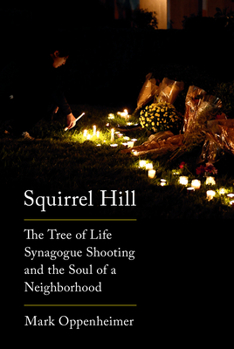Squirrel Hill: The Tree of Life Synagogue Shooting and the Soul of a Neighborhood
Select Format
Select Condition 
Book Overview
A piercing portrait of the struggles and triumphs of a singular community in the wake of unspeakable tragedy that highlights the hopes, fears, and tensions all Americans must confront on the road to healing. Squirrel Hill, Pittsburgh, is one of the oldest Jewish neighborhoods in the country, known for its tight-knit community and the profusion of multigenerational families. On October 27, 2018, a gunman killed eleven Jews who were worshipping at the Tree of Life synagogue in Squirrel Hill--the most deadly anti-Semitic attack in American history.
Many neighborhoods would be understandably subsumed by despair and recrimination after such an event, but not this one. Mark Oppenheimer poignantly shifts the focus away from the criminal and his crime, and instead presents the historic, spirited community at the center of this heartbreak. He speaks with residents and nonresidents, Jews and gentiles, survivors and witnesses, teenagers and seniors, activists and historians.
Together, these stories provide a kaleidoscopic and nuanced account of collective grief, love, support, and revival. But Oppenheimer also details the difficult dialogue and messy confrontations that Squirrel Hill had to face in the process of healing, and that are a necessary part of true growth and understanding in any community. He has reverently captured the vibrancy and caring that still characterize Squirrel Hill, and it is this phenomenal resilience that can provide inspiration to any place burdened with discrimination and hate.
Many neighborhoods would be understandably subsumed by despair and recrimination after such an event, but not this one. Mark Oppenheimer poignantly shifts the focus away from the criminal and his crime, and instead presents the historic, spirited community at the center of this heartbreak. He speaks with residents and nonresidents, Jews and gentiles, survivors and witnesses, teenagers and seniors, activists and historians.
Together, these stories provide a kaleidoscopic and nuanced account of collective grief, love, support, and revival. But Oppenheimer also details the difficult dialogue and messy confrontations that Squirrel Hill had to face in the process of healing, and that are a necessary part of true growth and understanding in any community. He has reverently captured the vibrancy and caring that still characterize Squirrel Hill, and it is this phenomenal resilience that can provide inspiration to any place burdened with discrimination and hate.
Format:Hardcover
Language:English
ISBN:0525657193
ISBN13:9780525657194
Release Date:October 2021
Publisher:Knopf Publishing Group
Length:320 Pages
Weight:1.48 lbs.
Dimensions:1.3" x 6.6" x 9.4"
Customer Reviews
1 rating
The Soul of a Neighborhood
Published by Rokinrev , 3 years ago
“There was no consensus over how to remember the dead”
“Squirrel Hill had been remarkably resilient, and that was something to be proud of. But peace had been purchased at a price”
“In the aftermath of a mass shooting there is the collective response and the individual responses”
"When the cameras and the police tape were gone, what stayed behind?"is the
the ultimate question Oppenheimer leaves us with. From the day of the shooting , he takes us as an observer into a year of mourning, but also a year of strength. He gives us no answers, but deals with victims and martyrs alike and what a profound individual trauma of the members of Tree of Life*Or’La Simcha. Oppenheimer’s exhaustive research is present on every page: through the eyes of the living, the survivors, the community and even at points from the people who were killed. Can anyone ever get over something like this? With love, patience and understanding is how it plays out and it isn’t all pretty. The span of emotions is almost a family going through stages of grief. In fact, it’s kind of how the book is set out as the “soul of the neighborhood” grieves along the same trajectory as the despair at a loss.
As a gentile I approached this book with some trepidation. Did I know enough about Jewish history and religious practices to wade into this book with understanding? As a retired interim minister, I know some of the issues around memory and the impact of buildings and the future. It’s hard to stay objective when you are so close to the subject but the author does just that, but with hesed [lovingkindness]. Squirrel Hill is his historical family home base, even though he no longer lives there. Just read the Notes on the reporting of interviews of 250 or so people. What an amazing book of sociological history, theological insight and caring that as much as possible be told. Highly recommended 5/5
[disclaimer:I received this book from an outside source and voluntarily read and reviewed it]





